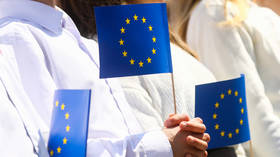EU needs veto overhaul – Italian PM

Italian Prime Minister Mario Draghi has urged the EU to make key decisions by a qualified majority, rather than seeking unanimous consent of its member states.
Draghi said that in the wake of the Covid-19 pandemic and Russia’s military campaign in Ukraine, the EU must learn to work more robustly and effectively.
“The geopolitical situation is undergoing rapid and profound change. We have to move, and move as quickly as possible,” Draghi told the European Parliament on Tuesday.
“Building a common defense must be accompanied by a united foreign policy, and effective decision-making mechanisms.”
We must move beyond the principle of unanimity, which gives rise to an intergovernmental approach based on mutual vetoes, and we must head towards qualified majority decision-making.
“A Europe able to make prompt decisions is more credible in the eyes of its citizens and in the eyes of the world,” Draghi said.
The PM urged to “streamline and optimize” military spending, and to process Ukraine’s application to join the EU “as quickly as possible.”
“We need pragmatic federalism, encompassing all areas affected by the ongoing transformations – from the economy to energy and security,” Draghi said.
The veto power allows the bloc’s individual members to strike down decisions that affect the EU as a whole. Most recently, Hungary said that it would not back a ban on Russian oil and gas because its economy is heavily dependent on energy supplies from Moscow.
Last week, the European Parliament approved draft proposals for a comprehensive EU reform, stating that most issues that are now “decided by way of unanimity should be decided by way of a qualified majority.”













